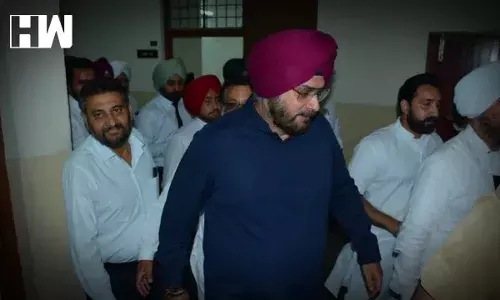New Delhi: Navjot Singh Sidhu, a Congress leader, surrendered in a Punjab court today, a day after the Supreme Court sentenced him to a year in prison for a road rage incident in which a man was killed 34 years ago. On health reasons, he had asked a couple more weeks to surrender.
Justice AM Khanwilkar instructed lawyer Abhishek Manu Singhvi, who represented Navjot Sidhu before the Supreme Court, to contact Chief Justice of India NV Ramana. However, Mr Sidhu’s team stated that the “issue could not be brought before the Chief Justice.”
Following the order, Mr Sidhu tweeted that he will “subject to the majesty of law.”
The cricketer-turned-politician, who recently resigned as Punjab Congress president after his party’s loss in the state election, was sentenced to one year of “rigorous jail” by the Supreme Court on Thursday.
Opposing Mr Sidhu’s request for time, the counsel representing Punjab said: “34 years does not mean the crime dies. Now the judgment is pronounced, they want three-four weeks again.”
Mr Singhvi replied: “I am saying I will surrender. It’s your discretion to consider.”
Justice Khanwilkar said: “Place a formal application and we will see. File this and mention it before the Chief Justice’s court, then we will see.”
The Supreme Court ruled on a plea filed by the family of a man who died in 1988 after a brawl with Mr Sidhu and his buddy. The family had requested a tougher punishment and a reconsideration of a Supreme Court judgment acquitting him of murder in 2018.
Mr Sidhu got into an altercation with Gurnam Singh, a Patiala resident, over a parking location on December 27, 1988. Mr Sidhu and a buddy, Rupinder Singh Sandhu, are accused of dragging Gurnam Singh from his car and hitting him. He died later in the hospital.
An eyewitness claimed Mr Sidhu killed Gurnam Singh with a hit to the head.
The Supreme Court in 2018 ordered Mr Sidhu to pay a fine of ₹ 1,000 rupees for voluntarily hurting a person.
However, the court, reviewing its own order, said it considered it “appropriate” to jail Mr Sidhu, saying “some aggravated culpability” must be attached if a person dies.
“In addition to the fine imposed, we consider it appropriate to impose a sentence of imprisonment for a period of one year rigorous imprisonment,” the Supreme Court said.
Mr Sidhu had filed an appeal with the Supreme Court, which lowered his sentence and dropped the case after ordering him to pay a fine, citing the fact that the incident occurred 30 years ago and Mr Sidhu had not used a weapon.
However, the victim’s family has requested that the 2018 ruling be reviewed.
“A disproportionately light punishment humiliates and frustrates a victim of crime when the offender goes unpunished,” the Supreme Court said.
As an independent media platform, we do not take advertisements from governments and corporate houses. It is you, our readers, who have supported us on our journey to do honest and unbiased journalism. Please contribute, so that we can continue to do the same in future.

